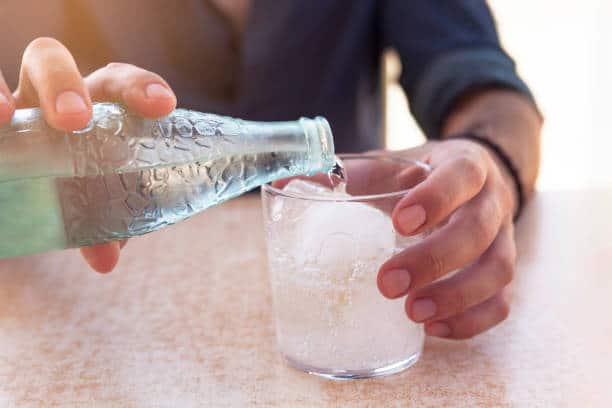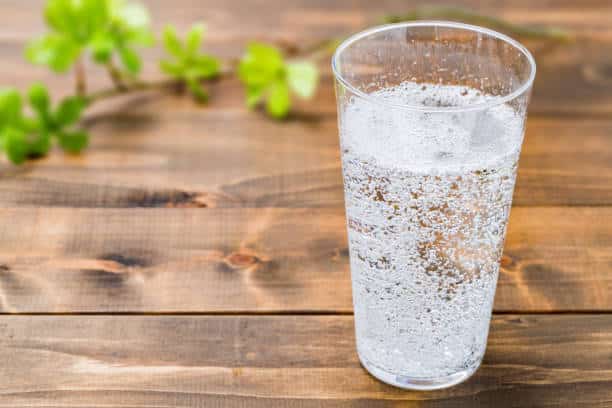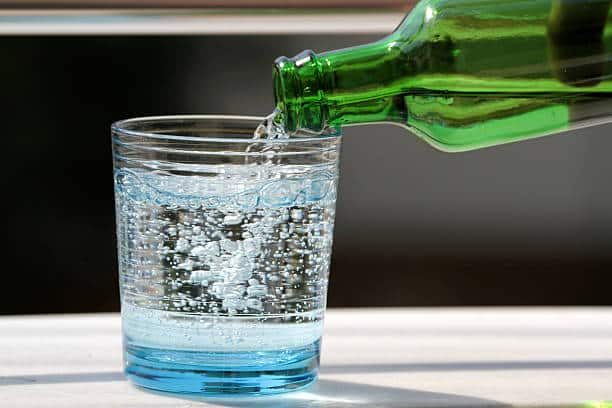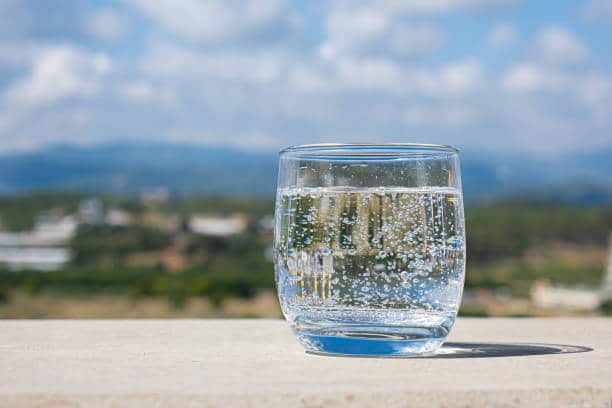There is a lot of misinformation out there about the health benefits and risks of drinking sparkling water. This debate’s range includes its effect on your bones, teeth, weight, and health in general.
Table Of Contents
−- What is sparkling water?
- Two main types of sparkling water
- What are filtered sparkling water systems?
- Health effects of sparkling water
But one of the most commonly asked questions is, how can something with no calories, no sugar, and no additives be so refreshing? If you want to know more about sparkling water and its health impacts, then read ahead.

What is sparkling water?
It is simply normal water that has been laced with fizzy carbon gas. In fact, a few studies have indicated that sparkling water has the same hydration capabilities as water.
Two main types of sparkling water
Sparkling water can either be natural or created artificially with a sparkling water system. Except for the flavorings used in flavored sparkling waters, which are sold separately, store-bought sparkling water contains no other ingredients. Fruit “essence” and oils could be used to impart a fruity flavor. There are two main varieties of pure sparkling water on the market today:
Sparkling mineral water

It’s mineral water with a bit of fizz. The fizzing is caused by gases found in nature, and it is obtained straight from the mineral springs themselves. Carbon dioxide is sometimes added artificially by sparkling mineral water producers to increase the volume of bubbles. Most brands of sparkling mineral water have a faint mineral flavor.
Seltzer water
This fizzy liquid is as basic as it gets. Its sole components are carbon dioxide and still water. This is the standard procedure for most commercially available sparkling water filtration systems and water dispensers in places like offices, cafes, restaurants, hotels, and resorts.
What are filtered sparkling water systems?
This is a natural and healthy way to provide great-tasting water. This work well with your tap water, reducing the contaminants in it. Contaminants removed include pesticides. Also, the minerals good for the body are left in the water. That’s what gives it its unique taste.
Health effects of sparkling water
There have been several studies regarding the health effects of sparkling water. This include:
Bone density
There have been claims that carbonated drinks cause osteoporosis and other bone diseases. A study in the American Journal of Clinical Nutrition found that older women, but not older men, who drank cola had lower bone mineral density than those who drank other carbonated drinks.
Celeste Robb-Nicholson, M.D., Harvard Women’s Health Watch EIC, said that other studies had found similar results. Caffeine in cola was thought to be a possible cause of the relatively low bone mineral density, but the studies said that more research was needed.
Hydration
However, there are mixed opinions when it comes to hydration with sparkling water. These bubbles could affect how much water you drink since it makes you feel full or cause indigestion, especially when consumed too rapidly.
While one study in the field of sports medicine revealed that participants were less likely to rehydrate if can easily find carbonated water, another found that children who had access to a home carbonation machine (such as a SodaStream) were better hydrated than those who did not.
Whether or not you drink more water than usual because you drink sparkling water may depend on how many bubbles you can handle.
Tooth decay
It’s true that drinking carbonated water might cause decay in your tooth enamel. This is the exterior, the hard layer part of your teeth. This is because carbonic acid, a waste product of water and carbon dioxide gas, is responsible for the bubbly, slightly sour flavor of carbonated beverages.
Carbonic acid has been discovered to have a minor erosive effect on teeth if exposed to it for extended periods of time. Citrus-flavored carbonated drinks, such as those flavored with lime, lemon, or grapefruit, contain trace levels of citric acid and are, therefore, slightly more erosive than plain carbonated beverages.
No need to worry too much, though, because the acids in sugar-free sparkling drinks are rather weak; therefore, the damage they do to your teeth is also minimal.
Researchers showed that soda was around 100 times more harmful to teeth than plain carbonated water. That’s why sparkling drinking water instead of sugary sodas is highly recommended by the Centers for Disease Control and Prevention.
How sparkling water damages your teeth

One of the things that people say about sparkling water is true: it could hurt your teeth. When the pH level drops below the critical pH, which is usually 5.5, teeth start to lose their minerals. Even though some sparkling waters are below the critical pH, most of them are much closer than soda or orange juice.
Carbonic acid is made when water and CO2 react. This means that all carbonated water, including plain seltzer water, is acidic. Acidic liquids, or those with a pH below 7, eat away at tooth enamel, making it easier to get cavities and other bad things for your teeth. Carbonic acid isn’t very strong, which is good news for people who like sparkles.
A Starbucks medium roast has a pH of 5.11, while Simply orange juice has a pH of 3.78. Even worse are drunk with citric acid, which is much more acidic. For example, the pH levels of Coca-Cola Classic and Pepsi are 2.37 and 2.39, respectively.
There are danger seltzer poses to your teeth varies depending a lot on your dental health history, how much acid and sugar you eat, and how much fluoride you get from mouthwash, tap water, toothpaste, and other dental products.
Carbonated, sugar-free drinks aren’t going to be a big reason why they get cavities – according to Dentist Andrew Swiatowicz.
What is meant by buffering capacity?
Buffering capacity means that the most factor is not only the drink’s initial pH but also how well it keeps its acidity in the presence of other substances. This is because saliva and other foods in a real mouth can change acidity levels.
What is sparkling water’s buffering capacity?
In 2007, Barry Owens from the University of Tennessee College of Dentistry in Memphis, USA, compared different carbonated drinks in a study. He found out that drinks made with cola were the most acidic, followed by drinks made with diet cola and then coffee.
Hence, the most acidic drinks were non-fruit-based carbonated drinks like cola (the diet versions did slightly better), followed by fruit-based carbonated drinks, fruit juice, and then coffee. In other words, some carbonated drinks can make the enamel less hard.
Studies on sparkling water’s effect on teeth
There have been several studies conducted on the effect of sparkling water on teeth.
Poonam Jain of Southern Illinois University School of Dental Medicine study
Poonam Jain at the Southern Illinois University School of Dental Medicine showed that the enamel does start to wear away by putting slices of enamel in different soft drinks for six, 24, and 48 hours.
Swedes study
In 2009, there was a published study of a 25-year-old bank worker who lost his front teeth after drinking half a liter of cola every day for four years, then a liter and a half every day for three years while also drinking fruit juice.
However, the method of consumption also has a role. He “held the drink in his mouth for several seconds, tasting it before swallowing,” as the report put it. Swedes studied the differences between short sips, lengthy sips, gulping, nipping, and sucking.
They discovered that the pH dropped significantly the longer an acidic beverage remained there. That is to say, the more acidic the mouth, the worse the burn. However, if you use a straw, the liquid will go directly to the back of your mouth, where it will do less harm.
Catriona Brown of the University of Birmingham study
Catriona Brown at the University of Birmingham placed human teeth extracted without erosion into jars for half an hour with various flavored sparkling water. The teeth were varnished except for a half-centimeter test region that was left uncoated.
They discovered the drinks softened tooth enamel as much as, or even more than, orange juice, which is already known to have this effect. The most acidic flavors included lemon, lime, and grapefruit, likely due to the usage of citric acid in their production.
However, in 2001, the Birmingham group tested seven different types of mineral water by once again pouring them over-extracted teeth.
Compared to still water, which has a neutral pH of 7, researchers discovered that sparkling waters ranged in acidity from 5 to 6 (making them less acidic than some cola drinks, which can be as high as 2.5). That is to say, they are, in fact, weak acids, as was hypothesized.
However, when compared to the erosive potential of other types of carbonated drinks, the effect of this weak acid was at least one hundred times less severe on the teeth.
Myths about sparkling water

Artificial sweeteners are bad for your health in a huge way. Studies have shown that diet soft drinks, more the risk of dementia and change the bacteria in the gut.
It directly affects your bone density
The Framingham Heart Study started in 1948 and followed a group of people for a long time to learn more about what makes people more likely to get heart disease.
Every four years, researchers from Tufts University in Boston do a lot of tests on these people. In 2006, the group looked at the link between bone density and carbonated drinks. They looked closely at the various drinks that more than 2,500 people consumed.
They found that women who drank cola-flavored carbonated thrice a week had hip bones with less bone mineral density on average. Other carbonated drinks didn’t change anything.
The authors think that the effect is most likely caused by caffeine and the actions of phosphoric acid, which are not well understood yet. Phosphoric acid is not found in sparkling water. It’s possible that it could stop calcium from being absorbed, but no one knows how.
It causes irritable bowel syndrome
Many have said that carbonated waters upset their stomachs (especially those that are sensitive to carbonated drinks). However, sparkling water does not cause the syndrome. In fact, a study revealed that carbonated water could help people with heartburn and constipation feel better.
It causes you to gain weight
Sparkling water can make you eat a lot, according to studies. A study by the American Heart Association found that “people who drank a diet soda every day had a 61% higher risk of vascular events than those who said they didn’t drink soda.”
However, fizzy water can also be used as a strategy to prevent overeating since it stimulates the sensation of fullness without causing any discomfort.
Drinking a lot of carbonated water can make you feel bloated, but scientists in Japan have found a use for this inconvenience. A group of ladies fasted overnight and then drank either still or sparkling water slowly.
The women’s bellies swelled somewhat, and they reported feeling full though they did not consume anything yet; they found that 900 ml of gas was released from just 250 ml of water.
It lowers calcium levels
There is zero proof that consuming carbonated water lowers calcium levels. An article published in 2006 suggested that this misconception originated from the observation that older women who consumed sugary drinks on a daily basis had somewhat poorer bone mineral density than those who did not. Drinking plain carbonated water had no effect on women’s bone density.
In 2001, a small Canadian study found that teenagers who drank a lot of fizzy drinks (but not sparkling water) had far less calcium in their bones. However, the researchers are not sure if it was attributed to the drinks or because people who drank them might choose them over milk.
Healthy tips when consuming sparkling water
Because of its crispiness and fizz, sparkling water is an irresistible beverage. If you can’t say no to this drink, but would also want to stay healthy, here are some tips you can apply.
Check the label
Make sure what you are drinking does not have artificial ingredients. Sparkling water may contain sodium. You might exceed the average daily sodium consumption of Americans by 1,000 mg.
Add natural flavor to the carbonated water
This is applicable if you feel that the water is too bland. You can add berries, lemon, and fresh herbs to make them more appropriate for your taste buds. With this, you get the needed nutrients plus natural sugar.
Do not drink too much sparkling water
Drinking too much might cause tooth decay. You can utilize a reusable straw to make sure that the carbonated water does not affect your teeth.
Bottomline
So, if you want something other than plain water, you could try sparkling water. It’s slightly acidic, but there isn’t much evidence that it’s bad for your bones, stomach, or teeth. But if you want to be safe and keep it away from your teeth, you might also ask for a straw when you answer “still or sparkling.”

Jay
Jay is a health and wellness enthusiast with expertise in water quality and nutrition. As a knowledgeable advocate for holistic well-being, Jay successfully manages Type 2 Diabetes through informed lifestyle choices. Committed to sharing reliable and authoritative insights, Jay combines firsthand experience with a passion for enhancing health."
